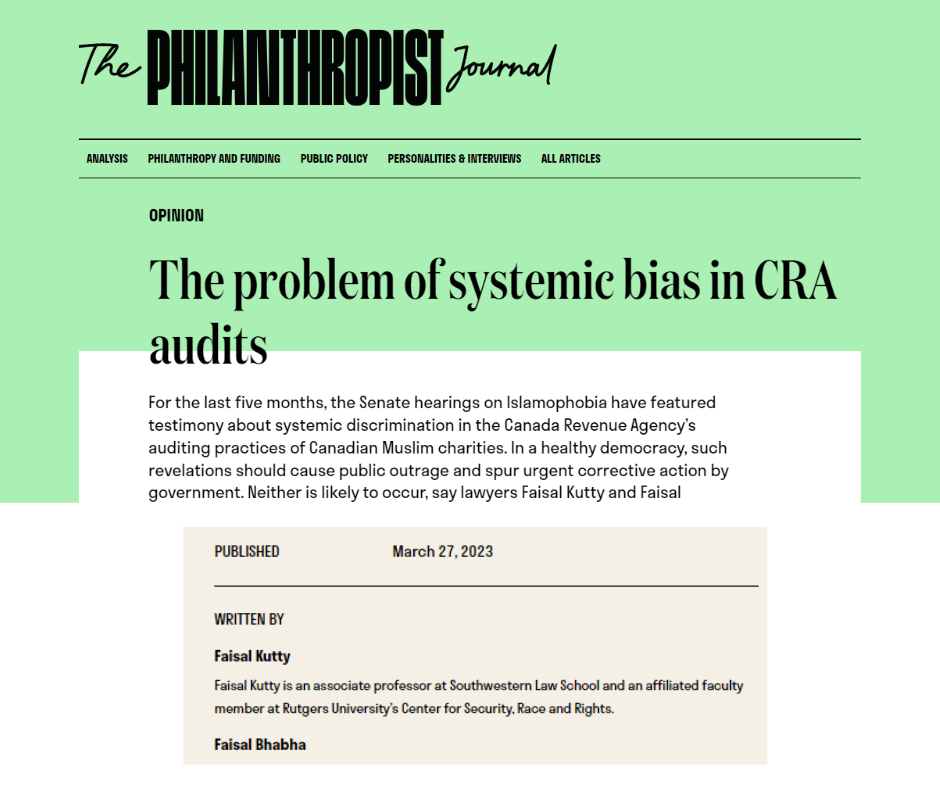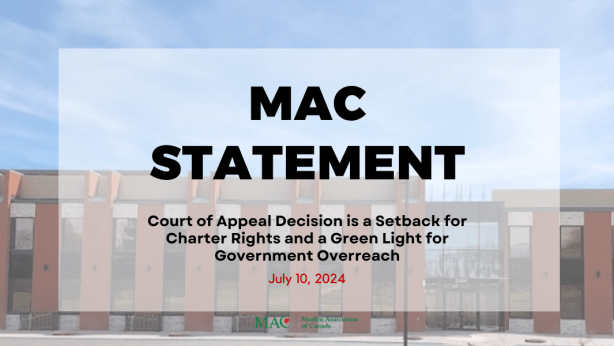The problem of systemic bias in CRA audits

March 27, 2023
For the last five months, the Senate hearings on Islamophobia have featured testimony about systemic discrimination in the Canada Revenue Agency’s auditing practices of Canadian Muslim charities. In a healthy democracy, such revelations should cause public outrage and spur urgent corrective action by government. Neither is likely to occur, say lawyers Faisal Kutty and Faisal Bhabha.
The Senate testimony detailed the problems with the CRA’s Review and Analysis Division (RAD), a unit responsible for investigating allegations of terrorism financing in the charitable sector. RAD has been found to disproportionately target Muslim charities, according to the International Civil Liberties Monitoring Group and the University of Toronto’s Institute of Islamic Studies. As lawyers working within the Muslim community, we have observed a widespread perception that Muslim charities are over-scrutinized. For years, Muslim charities quietly grumbled about discriminatory audits by the CRA but rarely complained publicly due to fear of reprisals and of frightening donors. After the evidence of anti-Muslim bias was publicized, civil libertarians spoke up.
In response, the National Security Intelligence Review Agency (NSIRA) started an investigation into the CRA’s work with charities. This came after a review by the taxpayers’ ombudsperson, mandated by the prime minister, was derailed by the CRA’s non-cooperation. In particular, the agency had denied the ombudsperson’s request for access to risk-assessment documents, which are key to understanding how the CRA assesses terrorism-financing risks. As a result, the ombudsperson’s final report stated that it was unable to fulfill its mandate of examining how RAD selects and treats Muslim charities. This failure leaves the public in the dark as to how the CRA makes terrorism risk calculations. Canadian Muslim charities are left with the impression that their religion is a factor.
NSIRA has announced its intention to investigate the decision-making process concerning Canadian registered charities to uncover the truth behind the discrimination allegations. While complete information may not be available, we can analyze previous cases of revocation involving Muslim charities to infer RAD’s methods for identifying and supporting findings of terrorism financing. RAD issues administrative fairness letters (AFLs) in each case, which provide a detailed explanation of the terrorism-financing allegation.
After reviewing numerous AFL documents, we have found that the CRA’s allegations of terrorism financing against Muslim charities often rely on biased opinions from terrorism experts, policies from right-wing think tanks, and distorted facts from Islamophobic media sources. This has led to a witch hunt against Muslim charities and a series of discriminatory revocations.
Reliance on biased terrorism experts
The CRA appears to make little effort to consult reliable experts, preferring ideologues steeped in American conservatism when it comes to understanding Muslims. For example, CRA draws heavily on Matthew Levitt, a former terrorism analyst with the US Federal Bureau of Investigation and the US State Department. Levitt, who has a PhD in US law and diplomacy, claims to be an expert on Palestinian terrorism. In 2007, he testified for the prosecution in the terrorism trial of the largest Muslim charity in the US at the time.
The CRA ignores that Levitt has never actually gone to the region for research purposes, does not speak Arabic, and has no expertise in the history or politics of the Middle East. According to a study conducted by University of Toronto law professor Anver Emon and a senior executive of the National Council of Canadian Muslims, Nadia Hasan, the CRA’s Charities Directorate relies solely on Levitt’s affiliations to US government institutions as evidence of his expertise and disregards the substantial criticism of his work among recognized academic experts in the field.
The CRA appears to make little effort to consult reliable experts, preferring ideologues steeped in American conservatism when it comes to understanding Muslims.
The CRA also relies on Matthew Epstein, a former US Treasury Department official and neo-conservative activist who wrote articles for Steve Emerson’s anti-Muslim Investigative Project on Terrorism (IPT) and has been reported to have run a campaign to manipulate American journalists to publish misinformation.
Evan Kohlmann is another CRA source who is a polarizing force associated with the Islamophobic IPT. According to a former CIA officer, Kohlmann’s opinions are “so biased, one-sided and contextually inaccurate that they do not provide a fair and balanced context for the specific evidence to be presented at a legal hearing.”
Another source relied upon by the CRA is Lorenzo Vidino, who promotes conspiracy theories about the Muslim Brotherhood and is connected to numerous anti-Muslim think tanks. Vidino has publicly demanded an “Al Capone law-enforcement approach” to cracking down on Canadian Muslim charities. If the government cannot shut down Muslim charities for criminal activity, he says, it should use tax violations. In his 2015 Senate testimony, Vidino raised the false spectre of the Muslim Brotherhood and other foreign groups influencing and even controlling mainstream Canadian Muslim organizations. Such statements not only defame Muslims as a whole; they incite Islamophobic extremists to commit acts of violence against Canadian Muslims, which has proven to be a more lethal problem in Canada than Islamic extremism.
According to testimony by the Muslim Association of Canada (MAC) at the Senate committee, the CRA audit their organization is facing is based on misinformation pushed by the self-styled Islamic extremism expert Thomas Quiggin. A former intelligence officer with a career in the military, Quiggin alleges widespread links between Canadian Muslim civic organizations, including charities, and terrorist organizations around the world….
Read the full article: The problem of systemic bias in CRA audits – The Philanthropist Journal
By Faisal Kutty & Faisal Bhabha, The Philanthropist Journal


